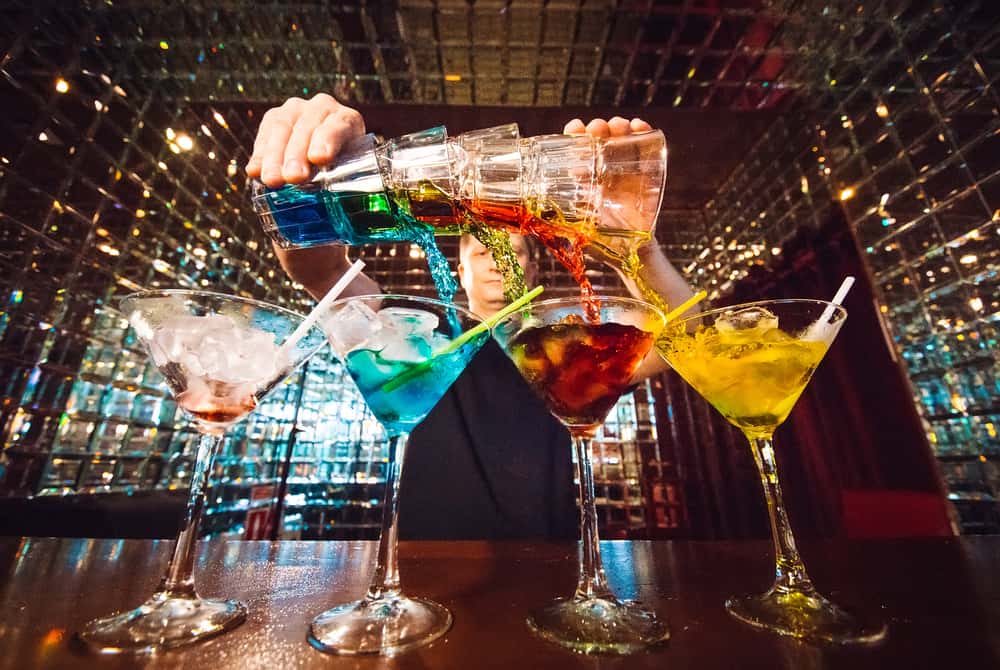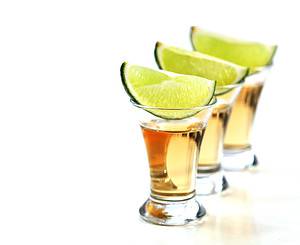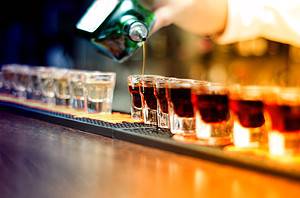Whether you are looking for a high-paying and flexible part-time job to pay down student debt or you are more long-term-minded and want to get started in a new and exciting career that offers plenty of opportunities, becoming a bartender might be just what you are looking for!
While the world of bartending offers countless benefits, like a flexible schedule, an exciting work environment, the ability to work anywhere, and, of course, tips, many people are not sure how to become a bartender.
This is where we can help! This thorough guide to becoming a bartender will cover everything from salary averages and licensing requirements to bartending schools you can attend to improve your skills and credentials.
If you have ever wanted to become a bartender, you have come to the right place!
Table of Contents
So, What Does a Bartender Do?
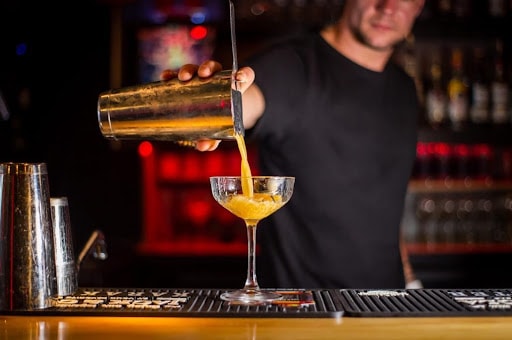
While you might assume that a bartender’s primary purpose is simply to hand alcoholic beverages to customers, their job is far more exciting and complex.
For starters, a bartender must visually assess the age of customers that walk into the bar. Depending on the particular legal requirements for the area where the bartender is serving, they may be required to check the identification of all customers to ensure they are of legal drinking age.
Once the bartender has confirmed that the customers are legally allowed to be served alcohol, a good bartender will warmly greet customers and inform them about any specials or drink deals available.
They will also help answer customers’ questions about the drink menu. The best bartenders are friendly and eager to answer questions, making drink recommendations to undecided customers.
Once the customers are welcomed and are prepared to place their drinks orders, a bartender could be expected to do the following:
- Take drink orders accurately.
- Pour wine into the appropriate glassware.
- Properly pour draft beer into the correct type of beer glass.
- Retrieve an open canned or bottled beer and ask if the customer would like a glass for their beverage.
- Create mixed drinks and cocktails according to their exact recipes.
- Record all drinks and food orders to present the customer with an accurate bill once they are prepared to close out their tab. If the customer has requested to pay for their order up front, the bartender will collect payment, process the order, return change, and present the customer with a receipt.
While the tasks mentioned above occur while assisting customers, there are other duties bartenders will need to perform. This can include cleaning the bar, workstations, and surrounding tables.
A bartender will also have to clean glassware and ensure they have an adequate supply of clean glasses on hand at all times.
A bartender often needs to maintain bar supplies, including liquor and liqueur, beer kegs, ice, refrigerated items, stocks of wine, and a wide variety of mixes. They will often need to prep garnishes, like lime wedges, mint springs, and much more.
Of course, each bar and restaurant may have its own set of tasks, so the above-mentioned responsibilities are only considered the basics.
How Much Does a Bartender Make?
The average salary for a bartender in the United States is $26,094. While this may seem pretty low, it is important to note that most bartenders rely heavily on tips to increase the amount they make.
You also have to consider that a bartender’s salary will depend heavily upon their bartending experience, the location where they are hired, and the type of establishment they work for.
While bartenders in more urbanized and trendy areas tend to have higher salaries, those in rural regions usually make a lower base salary. You also have to consider the type of establishment, as there is a pay difference between working as a bartender in a local dive bar or an upscale, expensive restaurant or club.
How Big of a Role Do Tips Play in a Bartender’s Wages?
When you consider tips, the average total salary for a bartender in the United States increases to $65,094! That’s almost exactly two-and-a-half times the salary.
Even inexperienced bartenders tend to double their annual take home with their tips. With that said, you cannot simply depend on tips, as they need to be earned. In other words, the better you are at your job, the higher the chances you will receive good customer tips.
How Long Does it Take to Become a Bartender?
How long it takes a person to become a bartender can vary widely. Where some people can simply approach a bar with a help wanted sign and start behind the bar with very little training, others can spend years studying and applying before they land their first bartending job.
It certainly helps speed up the process if you have experience in the service industry. Even if you have only worked as a waiter or waitress in the past, you will have learned related and valuable skills that can help increase the chances that an employer will take a chance on you.
Another useful option for those who aspire to become a bartender is to enroll in bartending school or attend bartending classes at a vocational or technical school. Naturally, employers are far more likely to hire those with the specialized skills required to work as bartenders, even if they do not have any actual work experience.
Does a Bartender Need to Be Licensed?
No, for the most part, a bartender does not need to be licensed. However, various state and county laws do require specific permits and certifications.
While you will need to look into regulations and legal requirements for the area where you are applying for bartending jobs, no national bartending license is needed.
Once you have looked into the requirements where you live and obtained all the relevant permits and certificates, you must consider your age, as you must be legally old enough to serve alcohol.
How Old Do You Need to Be to Become a Bartender?
In the United States, bartenders’ age restrictions vary from state to state. While some states require you to be of drinking age, meaning 21 years old, others are more flexible and allow younger individuals to serve alcohol.
While you will need to check the exact regulations for your home state, the range is between 18 and 21 years of age, so if you are older than 21, you can become a bartender anywhere in the country.
Again, make sure you also check to ensure that you are not required to take some form of safe alcohol awareness before you can work as a bartender, as some states and counties will have their own requirements for anyone serving alcohol.
How to Become a Bartender with No Experience
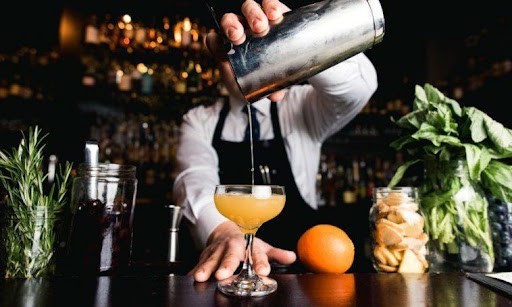
If you have absolutely zero experience working as a bartender, there are plenty of ways to get started and learn the requisite skills.
While there is no real substitute for on-the-job training and the lessons you would learn by enrolling in bartending school, the following are some other ways you can get started on the path to becoming a bartender:
1. Learn Everything You Can About Different Types of Drinks
When you are first starting and have no experience, you can increase your chances of getting hired by learning everything you can about different types of alcohol, mixed drinks, and classic cocktails. There are countless online resources, including informative and beginner-friendly cocktail-making videos.
Familiarize yourself with the different cocktails you can make with each type of alcohol. You can also learn the history and origins of different types of alcohol, as being knowledgeable about what you are serving is one of the best ways to stand out as a good bartender once hired.
2. Obtain All Required Permits for Your Area
As mentioned above, certain states and counties will have their own courses and certifications that bartenders operating in the area must complete. You must be able to meet state and local requirements before you apply for bartending jobs. Otherwise, potential employers will not even consider you for the position.
Not only are many of these certifications required before you can legally work as a bartender, but they will also explain important rules and regulations regarding serving customers. Some will also explain how you can identify and react to stages of intoxication in customers, as well as how you can spot minors and potential disturbances.
Some certificates are simple online courses that can take as little as a few hours to complete, but that does not make them any less necessary. Research requirements for your area and have them completed and listed on your resume.
3. Get Hired in the Service Industry
Even if you plan on becoming a bartender, you can still gain valuable experience by applying for related jobs. Employers looking for a bartender will recognize that you have experience in the service industry and your chances of being hired as a bartender in the future will greatly increase.
One of the most relevant and useful jobs you can apply for is to work as a barback. The barback position rarely requires experience, as they are just looking for eager individuals willing to work hard. Barbacks do much of the manual labor behind a bar, like cleaning, restocking glassware, prepping garnishes, and anything else the bartender needs help with.
You will learn about different liquor, beer, and wine brands by working in a service industry position, especially one where alcohol is served. You will also become comfortable with the pace of a bar or restaurant and learn how to interact with customers. These are all things future employers will take into consideration when assessing your bartender application.
4. Practice and Be Patient
Assuming you are of legal drinking age, you can also practice mixing drinks for friends and family at home and during various social events. You will be far more prepared to work behind a bar by learning how to do the basics, pouring a beer properly into a glass, or quickly mixing up a delicious cocktail.
You also have to be patient. If you are determined to become a bartender, accept that it may take as long as years to land the position, but it will be well worth the wait if it is what you want to do!
What Is a Mixologist?
A mixologist is someone that studies the history of mixed drinks and has a deep passion for the ingredients, combinations, and even the techniques used to prepare them. While the terms mixologist and bartender are closely related, they actually have distinct roles.
Where a bartender prepares classic cocktails, certain house specialties, or makes drinks from a recipe book, a mixologist is more of an innovator. They craft new cocktails and add their own twist to classics. Most of this is done behind closed doors, rather than in the presence of paying customers.
While a mixologist can work as a bartender, some hold strict consultant roles, meaning bars and restaurants will hire them to craft their own drink menu. Mixology can also just be a hobby, which means an individual crafts new and trendy cocktails, or invents their own, simply as a hobby.
How to Become a Mixologist
While just about anyone can practice mixology, it can take quite a lot of effort to become a professional mixologist. The best place to start would be to enroll in a mixology program. While most bartending programs will have a mixology component, you can also apply to specified mixology courses and programs.
In addition to taking mixology classes, there are real-world ways to learn the skills required of a mixologist. Work as a barback or even a bartender and learn everything you can about the art of making cocktails. Mentorship can play a major role, so it is worth applying to workplaces where a mixologist is already working.
Bartending School
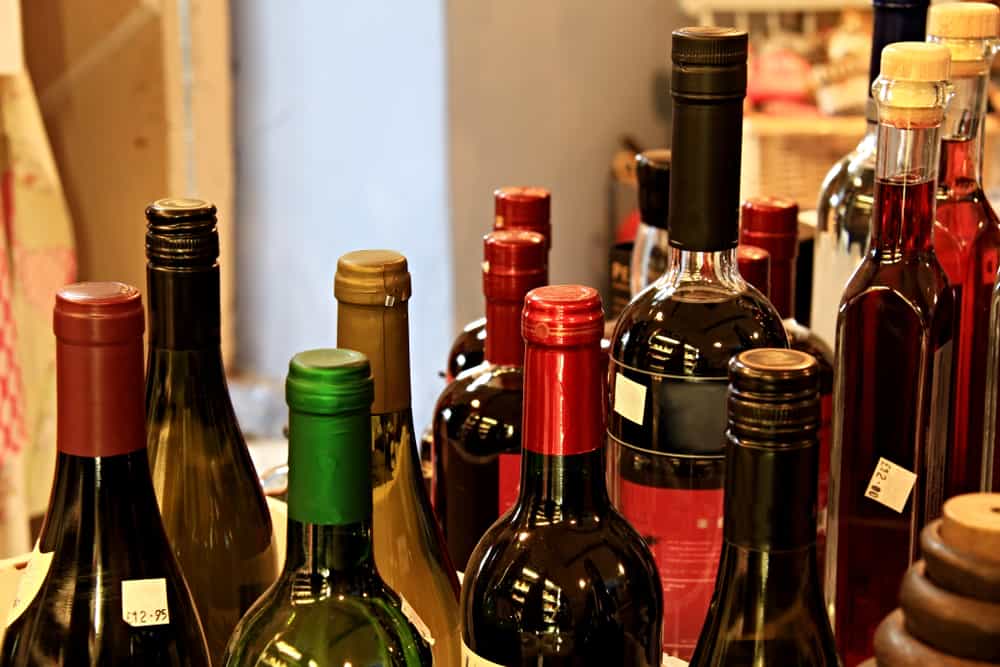
Not only can bartending school be useful for those that are hoping to learn the skills required to land their first bartending job, but it can also be a place where experienced bartenders can go to improve their skills, so they can apply for bartending jobs in more prestigious establishments.
Bartending school is also useful for those hoping to move into management positions, as it can teach you more about the ins and outs of the industry from a top-down perspective.
How to Find Bartending Schools Near Me
The best way to find a bartending school near you is to check the website for your local community college. Most community colleges will offer service industry-related programs, including bartending courses.
For standalone bartending schools, you can also use a search engine, like Google, to see if there is a recognized bartending school in your area. Once you have found one, read reviews and request a syllabus from the school.
Finally, you can also enroll in an online bartending school, as many online schools can provide you with legitimate certification and valuable education. For more information on online bartending schools, consider reading through www.LIQUOR.com’s informative article – The Best Online Bartending Schools.
Bartending Classes
You do not necessarily have to enroll in a full-length bartending program at a recognized bartending school to learn the skills required to work in the industry. You can also take a few bartending classes at your local community college or vocational school.
These classes can give you valuable hands-on experience without costing significant money or taking too much time. Taking a few classes is also a good way to see if the industry is right for you, as you may try it out and decide you do not really feel like bartending is as enjoyable as you believed it would be.
Mixology Classes
Just like bartending classes, it is possible to enroll in mixology classes. While some are offered as part of a comprehensive program that prepares students for a career as a mixologist, others are more casual and introductory classes that can help current bartenders and hobbyists learn more about mixology.
If you are interested in learning more about the art of mixology, check your local bartending schools, community colleges, and technical schools to see if they offer mixology classes for which you can sign up.
How to Become a Bartender at 18
If you are 18 years of age, or soon will be, it can be possible to become a bartender. However, you must check if you are legally permitted to serve alcohol in your home state. As mentioned above, certain states and counties have strict rules regarding the age of servers handling alcohol.
If you are applying for bartending jobs in a state that allows individuals 18 years of age to serve alcohol, you can apply for bartending positions the same way you would at any age. This means obtaining relevant service industry experience, attending bartending classes, and ensuring you have obtained all the legally required permits and certifications for your specific region.
Once you have the relevant credentials, simply apply for bartending positions. Again, it can help to take a related job, like a barback position, then move into a full bartending role once you have gained valuable, on-the-job experience.
Bartending Requirements for Specific States
How to Become a Bartender in Texas
To become a bartender in Texas, you simply have to obtain Texas Alcoholic Beverage Commission Certification or a TABC certificate. You also need to be at least 18 years of age to sell or serve alcohol, which applies to servers and bartenders.
Naturally, it will help you land a bartending position if you have relevant work experience or completed bartender school, but if you are 18 and have your TABC certificate, you can legally become a bartender in Texas.
How to Become a Bartender in California
In California, you must be 18 years old to serve alcohol in a restaurant but 21 years old to work in a bar. Bartenders and servers also must have completed Responsible Beverage (RBS) Training from a government-accredited license provider.
They must also pass the final exam within 60 days of their first position’s start date, which involves handling and serving alcohol. The RBS certification for passing the exam is valid for three years, so you must take it throughout your bartending career.
How to Become a Bartender in Ohio
You must be 19 years old to serve alcohol for on-site consumption in Ohio legally. Although Ohio does not legally require individuals to obtain any certification to serve alcohol, many employers still have their own requirements.
Most employers in the state will expect bartenders and servers to have completed the Ohio Alcohol Server Knowledge Program (ASK), a short course that explains state laws concerning the sale of alcohol in Ohio and rules regarding safe consumption. The classes are free, and they are available online. Given that they only take a few hours to complete, they are well worth your time.
Ohio Alcohol Server Knowledge Course
How to Become a Bartender in Florida
Florida does not require bartenders to have any sort of certification or licensing. The minimum age to serve alcohol is also 18, so as long as you are 18, you can legally become a bartender in the state.
With that said, each county has the authority to determine training requirements for servers and bartenders, so you should check with your local Alcoholic Beverages and Tobacco District Office for country-specific requirements.
How to Become a Bartender in Georgia
Georgia does not require bartending licensing, and the minimum age for serving alcohol is 18. You can increase your chances of getting hired by completing bartending and serving courses, but they are not mandatory.
How to Become a Bartender in New York City
New York City does not require bartenders to be certified, but they must be at least 18 years old. With that said, it can be a competitive market, so it can be useful to complete some level of bartending school if you are looking to be hired in a reputable bar or restaurant.
How to Become a Bartender in Pennsylvania
In Pennsylvania, anyone that serves alcohol must complete the Responsible Alcohol Management Program (RAMP) within six months of being hired. They must also be at least 18 years of age.
The state has relatively strict laws regarding the sale of alcohol, so it is important that you take the certification process seriously.
How to Become a Bartender in Massachusetts
Massachusetts does not have any state regulations or licence requirements for bartenders, but many employers will expect bartenders to have completed some level of training. Any employee that handles alcohol must also be at least 18 years old.
How to Become a Bartender in New Jersey
To serve alcohol in New Jersey, you must be at least 21 years of age. The state does not have any licensing or certification requirements for bartenders, but certain employers may expect bartender applicants to have some level of formal training.
How to Become a Bartender in Oregon
In the state of Oregon, all alcohol servers must have completed training through the Oregon Liquor Control Commission (OLCC). They must also carry an OLCC permit whenever they are working. The permit also needs to be renewed every seven years. Depending on the expiration date, that can require taking renewal classes.
To be a full bartender, you must also be 21 years old. However, those between 18 and 21 can obtain a minor service permit, which allows them to serve alcohol in areas where food service is the primary activity, which typically means restaurants.
How to Become a Bartender in Los Angeles
Los Angeles adheres to California state laws regarding the sale of alcohol. This means you must be 21 years old to work in a bar. Bartenders must also complete the Responsible Beverage (RBS) Training Program from a government-accredited license provider.
How to Become a Bartender in D.C.
The District of Columbia does not have any certification requirements for bartenders, but bartenders must be at least 21 years of age. While completing a Washington, D.C.-approved alcohol training program is recommended, it is not a legal requirement.
How to Become a Better Bartender
Becoming a better bartender is just like becoming better at anything else. The more you practice, the better your skills will become. You can practice making cocktails at home and learn more about the types of alcohol you serve.
If you are looking for different types of alcohol to practice serving at home, you can use our Liquor Store Locator Tool to find the best stores in your local area.
Another way to become a better bartender is to make sure you are always keeping a neat and tidy workstation, as organization is key when you are working in any sort of fast-paced environment.
Finally, you can take your bartending skills to the next level by watching educational bartending videos online, reading books written by skilled and famous bartenders, or enrolling in bartending classes or a full-fledged bartending school program.

